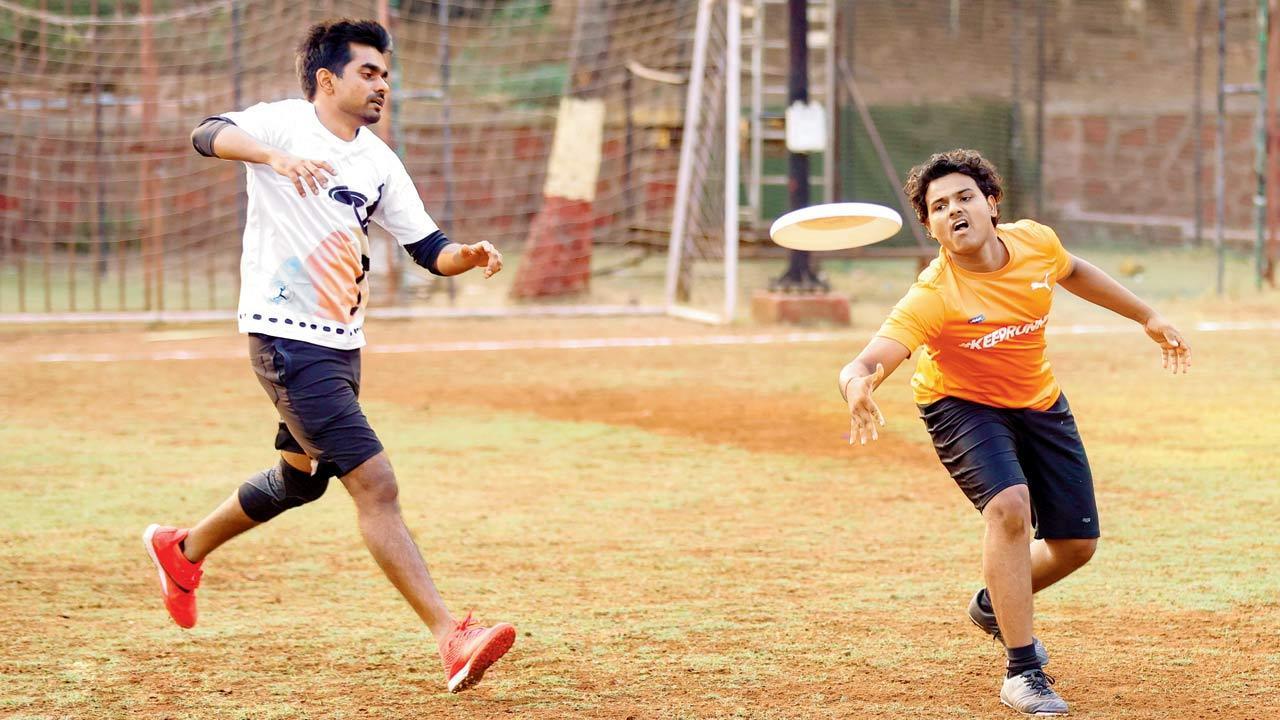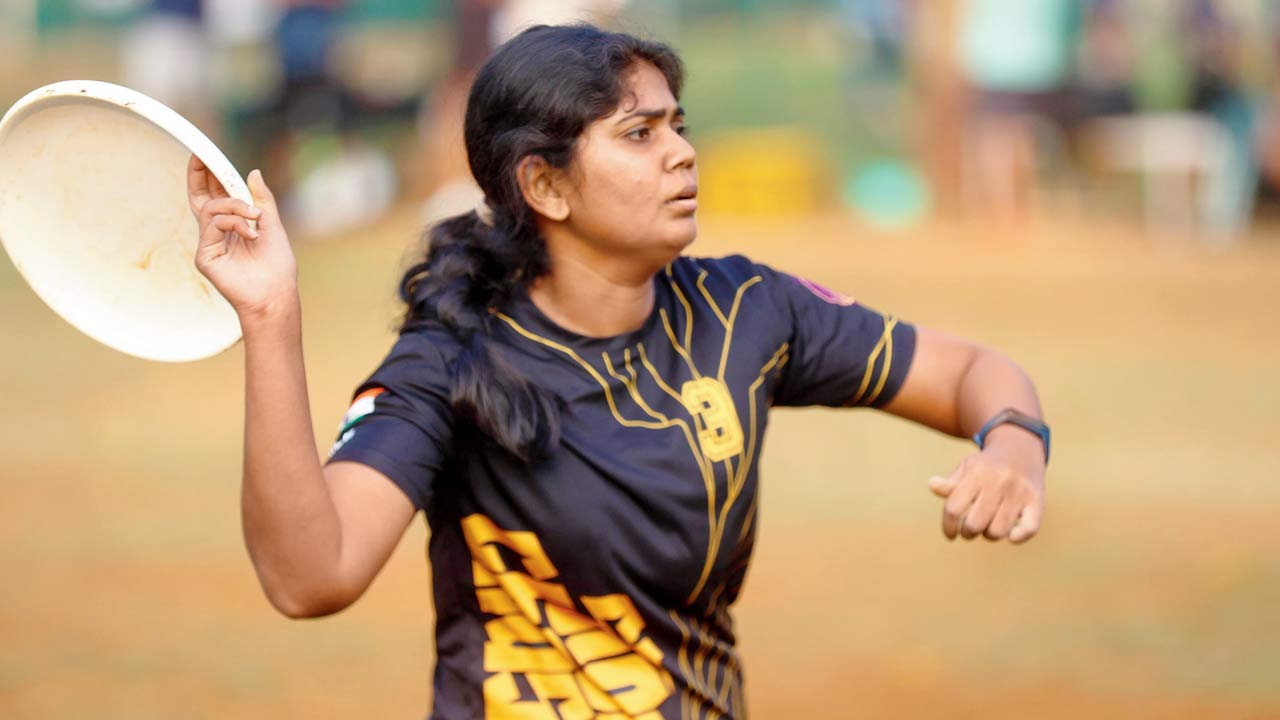Local teams are putting together a tournament to promote ultimate frisbee, a niche sport that promotes gender equity, sportsmanship spirit and community

Mumbai Local will see teams from Mumbai suburban, IIT Bombay, Virar, and Chinchwadi-Karjat
You must have seen frisbee players at Juhu beach over the weekends. Both men and women, clad in jerseys practise the sport on the sands. A closer look reveals club names printed on their tees, and if you observe further, you will see that their throws, unlike amateurs, are nuanced.
ADVERTISEMENT
These players are gearing up for Mumbai Local, an upcoming ultimate frisbee tournament on December 21 and 22 at Western Railway Ground, Lower Parel, that will see 10 teams, including clubs from across the city.
Ultimate Frisbee, often washed down as a pastime activity for kids at the beach, is as serious a sport as any. Played with flying discs on either sand or grass, the non-contact sport is played mix-gendered in India. This means that a team—usually comprising seven players— consists of both men and women. What’s fascinating is that the sport is self-refereed, and teams discuss fouls for 30 seconds before declaring the decision. At the end of the 75 or 90-minute game, this leads to spirit points, and either team is also declared the winner for the Spirit of the Tournament.

A total of 10 teams are participating this year, namely: Storm Chasers, West Coast Rascals, School of Ultimate, Night Crawlers, Down To Earth, Sealink Slammers, Disc Dominators, Rann Raanis, Night Crawlers 2, and The Flyweights.
“The award for the most spirited team is as important as winning the championship. International games have an ‘observer’ who offers perspective but it’s the team’s decision that’s final,” says Samarth Shetty, co-founder of School of Ultimate, a tournament director, and an ultimate player for Team India. Shetty says the game teaches respect, and conflict resolution, and keeps the sportsmanship spirit high. “As it allows different genders to play together, they are also pushed to grow as individuals,” he adds.
In India, the sport is popular in niche pockets and has quietly existed for some time. There is even a documentary by filmmaker Varsha Yeshwant that showcased the under-23 Indian Ultimate Frisbee team’s journey to the 2015 World Championship.
 Samarth Shetty, coach, School of Ultimate; (right) Manan Jain
Samarth Shetty, coach, School of Ultimate; (right) Manan Jain
Chennai’s beaches are home to some of the best ultimate frisbee players in the country. The city contributed 17 players for India’s 18-member team that won silver at the Asia Oceanic Beach Ultimate Championship 2024 in Japan. And, it’s home to the Ultimate Players Association of India also called the Flying Disc Sports Federation, the country’s only official body for the sport.
Bengaluru boasts 18 club teams; and institutes like Jain and Azim Premji universities, National Law College, IIM, and IISc, among others have teams that play the sport. “Chennai and Surat have some of the best talent in the country, and Delhi and Lucknow are seeing the sport blossom, too,” says Rishabh Kishore, community member of Mumbai Ultimate and co-founder of Off Season Ultimate. “In Chennai, the beach is free to use and that has seen kids from the neighbourhood and different backgrounds take to the sport. It’s why it thrives there. The sport is free to play [there], the sport is growing,” he adds.
This stands true for Assam’s Chirang district, which sees armed rebellion and instability. The sport, promoted by an NGO, The Action Northeast Trust, has brought together youth from different communities and trained over 4,000 players across 100 villages.
Closer home, Down To Earth (DTE), a non-profit in Mumbai that engages with children and youth from humble backgrounds, promotes the sport to encourage gender equity and boost confidence among women. Jyoti Chauhan, now a seasoned player and alumna of DTE, first began playing the sport thanks to the organisation. Chauhan says that growing up she had always seen men get more opportunities, and believed that they were more knowledgeable and skilled. That changed with the sport as it gave her a voice. “It’s self-referred and it’s all based on spirit, right? If you walk into a slum, there will be like 100 words coming out of people’s mouths, but none of them will be polite. In other sports, like football, you see aggression too. That is something different about ultimate frisbee. I have learned a lot from ultimate,” she says.
Chauhan is now working on Project Playquity for Pudiyador, an organisation in Chennai that is using ultimate frisbee to train women for leadership roles. The three-phase model swaps stereotypical gender roles in rural communities in India and gives women first access to resources through a sport-based platform. Each phase trains women to ultimately be in charge of teams of young boys whom they have to coach. Along the way, skill training for leadership roles like problem-solving, communication, and digital literacy is also offered in the programme.
Back at Juhu Beach, Mumbai Ultimate, a community of ultimate frisbee players in the city is hoping to see more Mumbaikars join in on the action. Mumbai Local is their effort to promote the sport in the city through which they hope to find and build talent. It’s here that the sport caught Digvijay Salunkhe’s attention. As an athlete, Salunkhe was looking for a team sport to be a part of, and upon enquiry was directed to Storm Chasers—one of Mumbai’s oldest frisbee clubs—by a friend at the gym. Two months in, he says, “I always enjoyed throwing a frisbee and used to do it by myself. But now I am picking up different skills. I also enjoy how it’s slightly acrobatic, and I have to dive to catch a disc. It feels like I’m performing a stunt.”
That excitement rings true for many ultimate frisbee players, who wonder why the sport is not more popular. “I think it just needs better marketing like pickleball,” jokes Manan Jain, a player with West Coast Rascals and an organising team member for the tournament.
The ultimate frisbee scene has existed in the city since 2009 and is sought after by expats as well as those who returned after studying abroad, but remains lesser known. Jain, too, encountered it thanks to word-of-mouth while looking for a less aggressive sport to play.
“I instantly fell in love with ultimate frisbee because I realised these are a bunch of people who are coming with a very positive attitude towards why we are playing. It changed my approach to the game. It made me realise that it is possible that you can win without having to be abrasively competitive,” adding that the community is a big reason why he has chosen to leave Delhi and live in Mumbai. He adds that local tournaments are a good way for players to come together but, “There is a social or an inclusive narrative to it also. For instance, we have two NGO teams [participating at Mumbai Local]. It’s a way to help kids interact because my circles would never coincide. So the sport is a great equaliser which brings people onto the same stage with the intent to get more people to play frisbee.”
Folks like Kishore and Shetty are making efforts to promote the sport at a grassroots level. In 2014, they helped put together Mumbai’s first frisbee tournament, Gheun Tak, which witnessed 16 teams from across the country. Kishore, along with co-founders Tahir Siddiqui and Maksood Choudhary, launched Off Season Ultimate in 2021 with the idea to do for frisbee what IPL did for cricket. Shetty has participated in ample international championships, improved his game, and now coaches at the School of Ultimate to improve the pool of talent. Shetty says that local tournaments are key to helping the sport grow at the grassroots, “Mumbai Local is a tournament that’s more accessible. It allows those players to participate who may not have the means to travel anywhere else.”
Kishore adds that more states need to play the sport for the Indian Olympic Committee to recognise it. “A lot of women in the country are playing a sport because of ultimate frisbee now. And, they can thrive at it. Children who plan to study abroad can pick it up and continue to play it when they move as it will help them inculcate in the communities there. This sport has a moral angle, and a qualitative aspect to it. It’s not just physical,” he says.
 Subscribe today by clicking the link and stay updated with the latest news!" Click here!
Subscribe today by clicking the link and stay updated with the latest news!" Click here!







